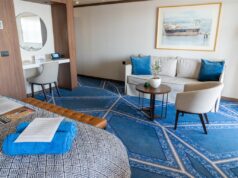The SILO building and the adjacent spaces comprising a total of 13,761 sqm. are conceded to the Ministry of Culture and Sports by P.P.A. S.A. in a special event at the company’s premises, in the presence of the Minister of Culture and Sports, Lina Mendoni, PPA’s Chairman, Yu Zenggang and the Chinese Ambassador to Greece, Xiao Junzheng. The agreement was signed by the Secretary General of Culture, George Didaskalou and PPA’s Acting CEO Zhang Anming. In the SILO building and the adjacent spaces, the Ministry of Culture and Sports has planned the creation of the Museum of Sea Antiquities. The project is financed through the funds that the Ministry of Culture and Sports has obtained through the Recovery Fund. The budget of the project amounts to €77,563,212 with a completion time by the end of 2025.
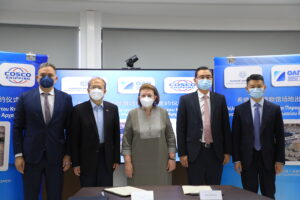 The concession period is set from the signing of the agreement until 12/2/2052 with a symbolic consideration. The specific concession is another targeted initiative implemented by PPA S.A. as part of the company’s holistic strategy, according to which the company, parallel to its business activity is steadily looking for ways to achieve benefit and generate added value for the local communities and the Greek society overall. In addition, this development is part of the Port’s expansion strategy aiming at enabling the perfect dialogue of the Port with the city and the communities it serves. The museum, based on the approved studies, also foresees a dedicated exhibition space for the housing of Chinese sea antiquities.
The concession period is set from the signing of the agreement until 12/2/2052 with a symbolic consideration. The specific concession is another targeted initiative implemented by PPA S.A. as part of the company’s holistic strategy, according to which the company, parallel to its business activity is steadily looking for ways to achieve benefit and generate added value for the local communities and the Greek society overall. In addition, this development is part of the Port’s expansion strategy aiming at enabling the perfect dialogue of the Port with the city and the communities it serves. The museum, based on the approved studies, also foresees a dedicated exhibition space for the housing of Chinese sea antiquities.
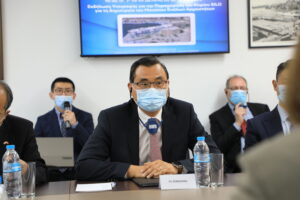 PPA’s Chairman Mr. Yu Zenggang expressed his satisfaction for the concession of the SILO building and the adjacent area, saying characteristically: “PPA S.A. chooses to grasp every opportunity that arises and entails benefit to the Greek society. The reconstruction of an old and historic building within the Port into a building for the exhibition of underwater antiquities is the most suitable choice for the area but also for this historic building. We are looking forward to seeing the Museum and the cultural coast coming to life. We are sure that they will become highlight areas within the port, open to all, attracting visitors from all over the world, while further advancing Greece role as a global cultural destination.”
PPA’s Chairman Mr. Yu Zenggang expressed his satisfaction for the concession of the SILO building and the adjacent area, saying characteristically: “PPA S.A. chooses to grasp every opportunity that arises and entails benefit to the Greek society. The reconstruction of an old and historic building within the Port into a building for the exhibition of underwater antiquities is the most suitable choice for the area but also for this historic building. We are looking forward to seeing the Museum and the cultural coast coming to life. We are sure that they will become highlight areas within the port, open to all, attracting visitors from all over the world, while further advancing Greece role as a global cultural destination.”
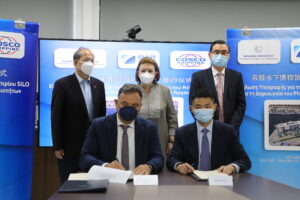 As the Minister of Culture and Sports Lida Mendoni stated: “this day is very important, as it marks the beginning of the creation of the Museum of Sea Antiquities in Piraeus. The establishment of a Museum within the Port strengthens Piraeus’ cultural and growth potential, but at the same time provides added value to P.P.A.’s investment. The SILO building transformed into a Museum of Sea Antiquities – one of the few available museums of its kind internationally – will showcase the archeological treasures of the Greek sea, while it will also function as a touristic attraction and growth resource for the town of Piraeus.
As the Minister of Culture and Sports Lida Mendoni stated: “this day is very important, as it marks the beginning of the creation of the Museum of Sea Antiquities in Piraeus. The establishment of a Museum within the Port strengthens Piraeus’ cultural and growth potential, but at the same time provides added value to P.P.A.’s investment. The SILO building transformed into a Museum of Sea Antiquities – one of the few available museums of its kind internationally – will showcase the archeological treasures of the Greek sea, while it will also function as a touristic attraction and growth resource for the town of Piraeus.
The bonds of the two countries in the Cultural sector remain very close. Both countries are superpowers in this area, China in the East and Greece in the West. Greece and China work together in the research of the sea antiquities based on the current protocol. Our signature confirms this cooperation in the most obvious way. With China binds us together the participation of our countries in the Forum of Ancient Cultures. I would like to thank the Chairman of PPA, Yu Zenggang and especially the Chinese Ambassador to Greece, Xiao Junzheng for our cooperation towards the facilitation of this project”.
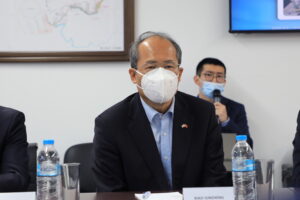 It is noted that in last January the Council of Museums of the Ministry of Culture and Sports issued a favorable opinion to the architectural, static and electromechanical preliminary plans as well as the museographical preliminary study, which have been financed by Aikaterini Laskaridis Foundation, and also to the amendment of the building programming.
It is noted that in last January the Council of Museums of the Ministry of Culture and Sports issued a favorable opinion to the architectural, static and electromechanical preliminary plans as well as the museographical preliminary study, which have been financed by Aikaterini Laskaridis Foundation, and also to the amendment of the building programming.
The Museum of Sea Antiquities will host findings from Greek seas: statues, parts of sculptures, exchange means, ship hulls and ship equipment, weapons tools, inscriptions, toiletries, functioning and table pottery, utilities and diverse objects obtained through underwater inspections, explorations and excavations, but also through voluntary offerings by private individuals or seizures.
 The museum’s premises will exceed 13,000sq.m. and will be divided into galleries for permanent and temporary exhibitions; facilities for educational programs, science activities (amphitheater, library, multimedia) and preservation workshops; visitor areas (reception, cloakroom, shop, cafe/restaurant, medical facilities), and administration offices.
The museum’s premises will exceed 13,000sq.m. and will be divided into galleries for permanent and temporary exhibitions; facilities for educational programs, science activities (amphitheater, library, multimedia) and preservation workshops; visitor areas (reception, cloakroom, shop, cafe/restaurant, medical facilities), and administration offices.





